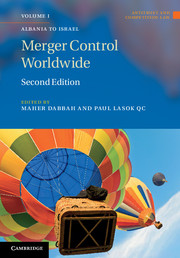Book contents
- Frontmatter
- Contents
- Preface
- List of Contributors
- Table of cases
- Table of Legislation and Official Guidance
- Introduction
- Albania
- Argentina
- Armenia (Republic of Armenia)
- Australia
- Austria
- Barbados
- Belgium
- Bosnia and Herzegovina
- Brazil
- Bulgaria (Republic of Bulgaria)
- Canada
- Chile
- China*
- Costa Rica
- Croatia
- Cyprus (Republic of Cyprus)
- Czech Republic
- Denmark
- Estonia
- European Economic Area
- European Union
- Finland
- France
- Germany (Federal Republic of Germany)
- Greece
- Hong Kong
- Hungary
- Iceland
- India
- Indonesia (Republic of Indonesia)
- Ireland
- Israel
- Italy
- Japan
- Kenya
- Korea
- Latvia
- Lithuania
- Macedonia (Republic of Macedonia)
- Malta
- Mexico
- Netherlands (The Netherlands)
- New Zealand
- Norway
- Pakistan
- Peru
- Philippines (Republic of the Philippines)
- Poland
- Portugal
- Romania
- Russia
- Serbia
- Singapore
- Slovakia (Slovak Republic)
- Slovenia
- South Africa
- Spain
- Sri Lanka
- Sweden
- Switzerland
- Taiwan
- Thailand
- Tunisia (Republic of Tunisia)
- Turkey
- Ukraine
- United Kingdom
- United States of America
- Uzbekistan
- Venezuela
- Zambia
- Index
Peru
Published online by Cambridge University Press: 05 November 2014
- Frontmatter
- Contents
- Preface
- List of Contributors
- Table of cases
- Table of Legislation and Official Guidance
- Introduction
- Albania
- Argentina
- Armenia (Republic of Armenia)
- Australia
- Austria
- Barbados
- Belgium
- Bosnia and Herzegovina
- Brazil
- Bulgaria (Republic of Bulgaria)
- Canada
- Chile
- China*
- Costa Rica
- Croatia
- Cyprus (Republic of Cyprus)
- Czech Republic
- Denmark
- Estonia
- European Economic Area
- European Union
- Finland
- France
- Germany (Federal Republic of Germany)
- Greece
- Hong Kong
- Hungary
- Iceland
- India
- Indonesia (Republic of Indonesia)
- Ireland
- Israel
- Italy
- Japan
- Kenya
- Korea
- Latvia
- Lithuania
- Macedonia (Republic of Macedonia)
- Malta
- Mexico
- Netherlands (The Netherlands)
- New Zealand
- Norway
- Pakistan
- Peru
- Philippines (Republic of the Philippines)
- Poland
- Portugal
- Romania
- Russia
- Serbia
- Singapore
- Slovakia (Slovak Republic)
- Slovenia
- South Africa
- Spain
- Sri Lanka
- Sweden
- Switzerland
- Taiwan
- Thailand
- Tunisia (Republic of Tunisia)
- Turkey
- Ukraine
- United Kingdom
- United States of America
- Uzbekistan
- Venezuela
- Zambia
- Index
Summary
At the start of the 1990s, the Peruvian government implemented a profound macroeconomic stabilisation and structural adjustment programme that led to the abandonment of all forms of import-substituting industrialisation policies, eliminated price controls, freed the exchange rate and interest rates, liberalised trade, gave equal treatment to foreign investors, initiated a comprehensive tax reform and redefined the state’s involvement in the economy, moving it away from the role of directly producing goods and services and towards the role of supervisor and regulator of private actors and privatised companies in a competitive environment.
Among the pillar reforms implemented, between November 1991 and late 1992, Peru enacted for the first time legislation on competition, consumer protection, commercial advertisement and unfair competition, all of which had a primarily facilitative function of bringing into being and strengthening competitive markets.
Consolidating these reforms, the Peruvian Political Constitution of 1993 adopted a social market economy model, based on the recognition and protection of fundamental individual economic freedoms (i.e. free trade and freedom of enterprise, freedom of contract, property rights, equal treatment of domestic and foreign investment, among others) and the subsidiary role of the state in economic activities. Within this framework, Section 61 of the Peruvian Constitution proclaims that ‘the State combats all practices that limit [competition] and the abuse of dominant or monopolistic positions in the marketplace’, explicitly prohibiting the authorisation or establishment of monopolies through laws or cartels. Interpreting this constitutional provision, the Peruvian Constitutional Tribunal has afirmed that the acquisition of a dominant position or a monopoly through the legitimate means of the competitive process is not in itself illegal.
- Type
- Chapter
- Information
- Merger Control Worldwide , pp. 1054 - 1068Publisher: Cambridge University PressPrint publication year: 2012



